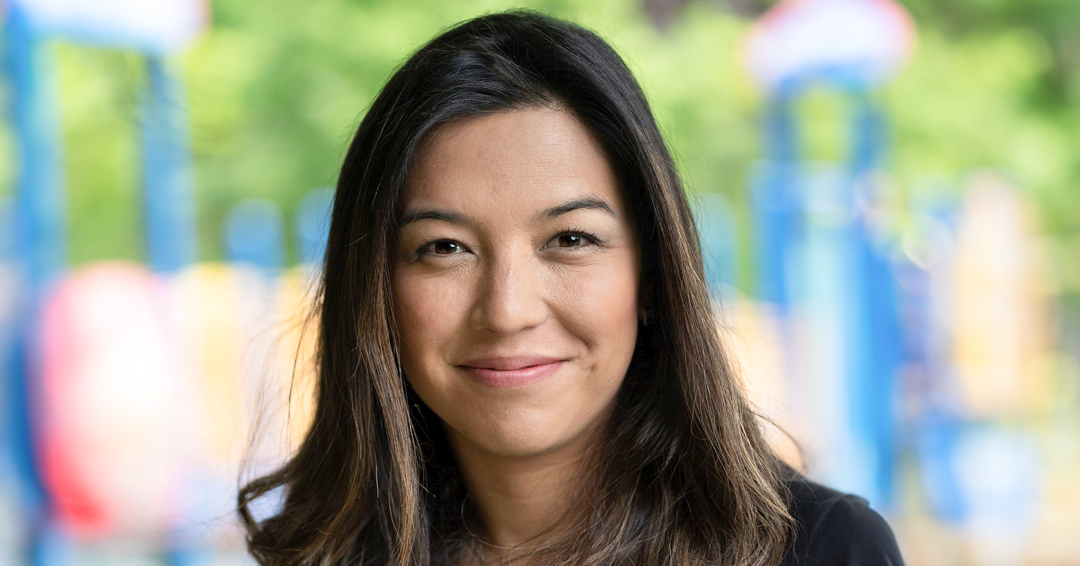
Part of our series: FMHS community members from away – The Faculty of Medicine and Health Sciences (FMHS) is made up of diverse communities, including people from across Canada and around the world. This series recognizes those from outside the province who have chosen to bring their talents and expertise to McGill University. Thank you for all that you contribute!
Keiko Shikako, OT, PhD, moved from Brazil to Canada nearly 20 years ago to pursue a master’s degree in Rehabilitation Science, with the intent of applying her previous experience as a pediatric occupational therapist and early childhood music educator to the treatment of children with disabilities. Her success would lead the now Associate Professor in the School of Physical and Occupational Therapy at McGill University, to become a disability rights advocate informing public policy towards the implementation of the United Nations’ Convention on the Rights of Persons with Disabilities.
Success at both the academic and public policy levels have convinced Prof. Shikako that her decision to attend McGill was wise. “I knew that the Rehab Science program at McGill was renowned worldwide, and I always appreciated the diverse languages and multicultural environment that the university provides. I also wanted to live in Montreal. I always thought it was an easy place to be as an immigrant to Canada. I took French classes before coming and as soon as I arrived, to be able to practise occupational therapy and integrate the Quebec culture.”
A mother of two, Prof. Shikako enrolled her children in French elementary school. “We speak Portuguese at home. They are in secondary now and they speak the three languages (Portuguese, French and English) fluently, and they can operate very naturally in any of those three languages,” she says. “This is the reality for all of their friends. Everybody’s very proud of their heritage. But at the same time, everybody’s making an effort to learn French.”
Her path to social advocacy began believing music could be therapeutic for children with disabilities. “In Brazil, I used to teach music and do occupational therapy groups using music as a medium for children with multiple disabilities. Part of my research shows the importance of leisure and play for the development, well-being and inclusion of children in various aspects of society.”
Intending to facilitate access to participation in leisure and community for children with disabilities, Prof. Shikako co-developed a mobile application after her PhD studies called Jooay (jooay.com). Its title derived from ‘jouer,’ the French word for play, the app helps locate leisure opportunities that are close-by, accessible, and that suit the needs of children with disabilities. Jooay also helps parents, rehabilitation professionals, and educators connect and exchange pertinent information about leisure and inclusion.
“We launched it in 2015 and today we have over 3,000 users,” says Prof. Shikako. “We have almost 4,000 activities that are inclusive or adaptive, listed across all Canadian provinces. We are implementing gamification features in the app which, in addition to parents, clinicians, and educators, will allow for a higher involvement of youth with disabilities with the app, and consequently with leisure opportunities in their communities. These features will make the app more fun to use and interact with, and we are measuring how people are interacting with it and how to build more inclusive technology for people with disabilities.”
The combined results of her research, which includes the Jooay app and other projects involving knowledge translation to policy, have fostered several policy dialogues that have included representatives of Quebec municipalities, organizations that promote leisure in Quebec, educators, and families, says Prof. Shikako. “Through our research we have prompted the integration of inclusive directives for the ‘Ville amie des enfants,’ an initiative of Quebec Ministry of Families and Children, where municipalities can become accredited as child-friendly cities. We’ve contributed expertise on what makes cities accessible for children with disabilities and their families, and have added inclusive public play spaces like playgrounds and parks into the Jooay app. The goal is to make cities more accessible to children with disabilities, and to bring the information about inclusive spaces to the families and children.”
An Associate Member of the Department of Ethics, Equity, and Policy, holding a Canada Research Chair in Childhood Disability, Prof. Shikako says, “The ultimate goal is to create, just, equitable, and inclusive communities with policies that consider the needs of children with disabilities and their families.”
Achieving that goal relies on having detailed knowledge of the demographic, and that has become another focal point in Prof. Shikako’s efforts. In a paper titled Giving A Voice To Children’s Rights published by the Council of Canadians with Disabilities, she highlighted Canada’s lack of data. “Canada has not collected data on children with disabilities since 2006. Canada’s current data collection tool, the Canadian Survey on Disability, excludes children from birth to age 14. Without this information, targeted programs cannot effectively be formulated to specifically address and improve the situation of children with disabilities in Canada.” This information was also presented by Dr. Shikako to the United Nations Committee on the Convention of Persons with Disabilities during the first reporting of Canada to the committee. Following this, the UN committee made the recommendation to collect more data on children with disabilities in Canada.
Since then, the data has started to accumulate. “Questions about children with disabilities have been integrated into the Canadian Health Survey on Children and Youth, and my team is completing a CIHR-funded project in collaboration with Statistics Canada and UNICEF Canada to identify child disability indicators to inform the Canadian Index of Well-being framework.”
Related:
https://healthenews.mcgill.ca/strength-in-diversity/
https://www.chairs-chaires.gc.ca/chairholders-titulaires/profile-eng.aspx?profileId=3577
https://www.childhooddisability.ca/
